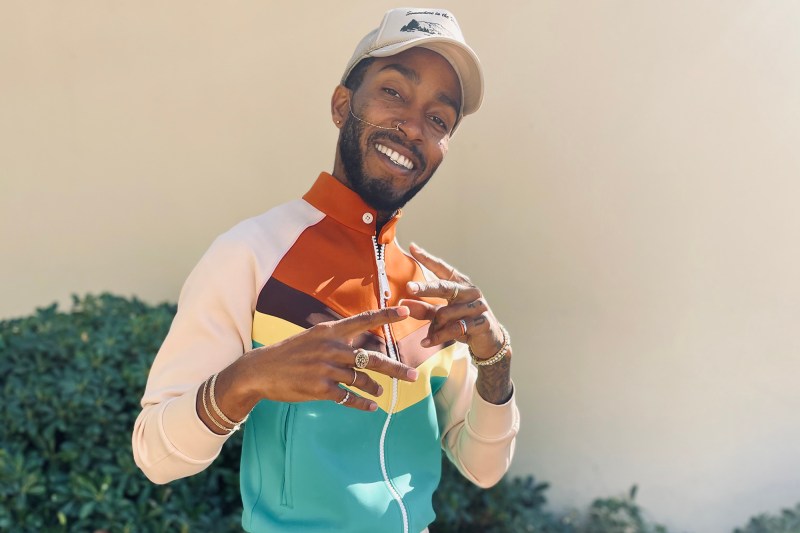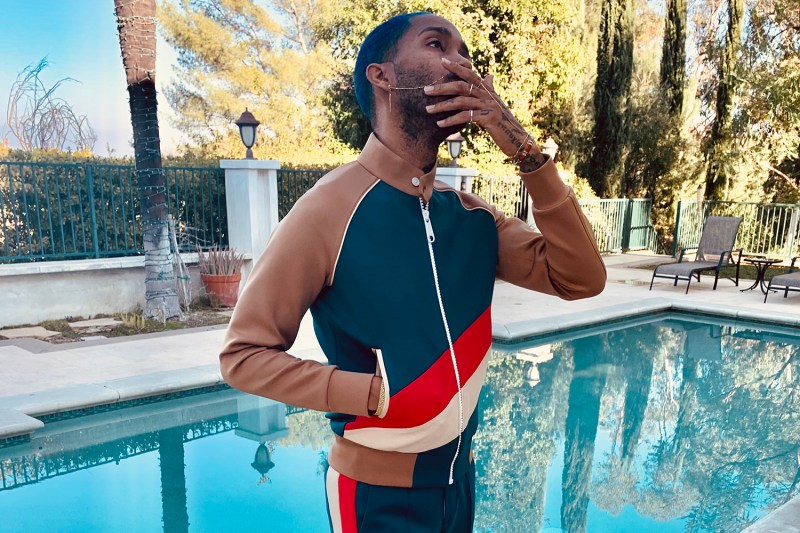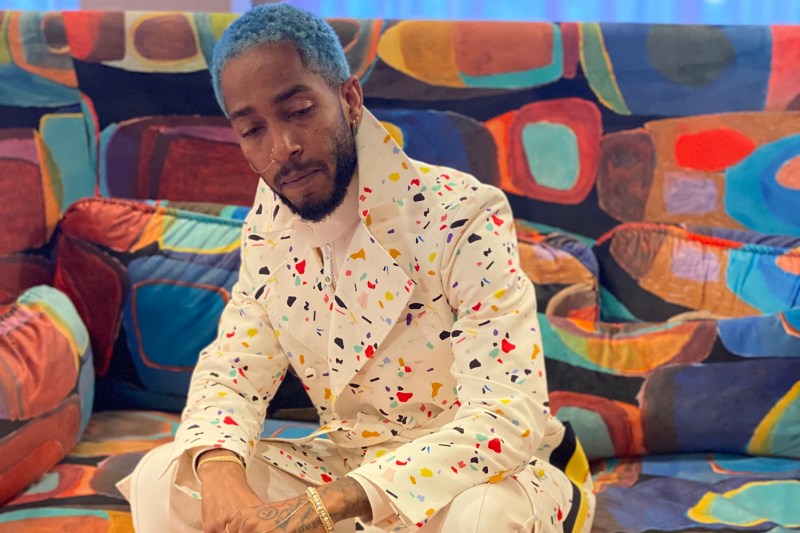
Even now, celebrity tailor Richfresh remembers watching it happen. That guy back in Memphis, Tenn., in his early 20s and a couple years older than Fresh (a name Richfresh also goes by), wearing a secondhand Rolex around his wrist while still renting an apartment. And then he doubles down, buys a used Jaguar. “We went to church together,” the 41-year-old Fresh, from his home in the Hollywood Hills, tells The Manual, awe still in his voice. “I know his whole story.”
Fake it ‘till you make it. Everyone knows the phrase, and doubtless Fresh, now one of the premier bespoke tailors to the stars and founder of the Richfresh fashion label, had heard it countless times in his young life, first in Germany and then in Little Rock, Ark., before moving to Memphis. But it was seeing that guy right there, right then, manifest, that changed him. Fresh was a scientist behind glass, observing, taking notes. Should this guy falter, well, there it was it, clear evidence that the opposite; frugality, modesty, the long view, the long road, was the way to go.
Related Guides
But somehow it worked.
Fresh finishes in a rush: How that guy happened to be somewhere one day where he met another guy who owned the same Jag. The guy turned out to be a real estate magnate — here Fresh actually uses the word “magnate,” whatever that is — and the two bond over a love of the English luxury carmaker, and Mr. Magnate hires this fake-it-‘till-you-make-it friend based in part on that initial connection.
“He faked it ‘till he made it, but he didn’t fake it to bulls–t,” Fresh says. “He faked it because he knew he was going to make it.”
It’s this lesson, maybe more than his overwhelming skill as a tailor, that has driven Fresh to his current heights and only loftier goals. Despite the fact that he taught himself to sew without aid of formal schooling, he arrived in Los Angeles in 2013 and wrote “celebrity tailor” on his social media bios. He then dutifully posted with that identity in mind, framing his photos a certain way, mentioning himself doing certain things. “A celebrity tailor’s only going to do fly s–t,” he says. Never mind the fact that he’d yet to work with a single celebrity as a tailor or otherwise. “It doesn’t matter,” he continues. “It’s in you. Just claim that s–t, man.”
As of July 2021, it would exhaust this writer’s entire allotted word count to list Fresh’s past A-list clients. (A taste: John Legend, Justin Bieber, the Weeknd, Steph Curry, and on and on and on.) When asked about his dream subjects, he’s listed BTS, Megan Rapinoe, Cristiano Ronaldo, and Barack Obama, though that list is in need of revision after he outfitted the former president with a tracksuit in February. Like some digital vision board or sartorial Field of Dreams, he built it, and they came. “The next thing you know, I am the premier celebrity tailor,” he says. “It just came from saying it.”
Even his name: Richfresh. Born Patrick Henry, when he moved west, he changed it to match his destiny. “I’m rich, I’m rich, I’m rich,” he says. “I knew at some point it would just become part of my frequency, being rich, [and as a result,] I started carrying myself differently.”

It’s easy to discover the start and jetpack to the endpoint, concluding it’s been a linear ascent: Envision success and success comes a-courting. But Fresh’s story can smooth over the valleys along the way. After leaving Ermenegildo Zenga to launch his first clothing brand in Los Angeles, a few poor decisions and some bad luck combined to leave him penniless and living in a homeless shelter. There, in one of the darkest periods of his life, he says he considered selling insurance and leaving fashion altogether. He would watch the movie The Pursuit of Happyness, which follows the year-long homelessness of a future stockbroker and his son, missing his daughter, who lived with her mother back in Ohio. His unshakeable sense of destiny had been shaken to the core. “I’d be lying and say I hit the shelter and kept my head up,” he says. “Naw, I was down. I was done. My mind was gone, my soul was leaving.”
In the Bible, Job kept his faith in first flush of losses: his family, his possessions, his health. But even he, a man deemed blameless in the sight of God, eventually broke down and contended with the Almighty. And so it was with Fresh, who, at his lowest, lost his faith, only to hear the voice of God. He says this without smile or his usual braggadocio. “It was, like, this is your test. This is your thing. If you keep your head up and you stay focused, you’ll get out of here and you’ll be greater than when you came.”
Fresh’s label Richfresh was launched in 2018 largely based on doing the opposite of the very mistakes that sunk his first attempt. Whereas his previous suiting was cut and shipped from China, now they’d be stitched together under his figurative and sometimes literal gaze in Los Angeles at his very own factory. And rather than having a price point between $500 and $1,000, a bespoke Richfresh suit will cost you $5,000 and up. He points to the late L.A. rapper Nipsy Hustle, who sold his mixtape on the street for $100 when other aspiring artists would beg for $10. “[Hustle] told you he was going to give you more value,” Fresh says. “The people that want value are going to spend money on value. We’ll find the people that want the value.”
He was also clear on the vision for the label: no t-shirts or hoodies. The streetwear that so many others were doing, they could have. “I want to do luxury, and I want to do it unapologetically,” he says. And so Richfresh would become the first Black luxury brand.
“Black consumers don’t have a Black luxury brand to consume,” Fresh says. Just like everyone else, they had to go to Europe or nowhere. “I just felt like that was something [Black people] didn’t have that we should have. We’ve got fly stuff. But for the guy that’s used to wearing Armani or Tom Ford or Purple Label, where can he go to get a suit?

“‘Who do you think you are?’” he parrots. The answer: “I think I’m luxury.”
Even his limited-edition made-to-wear collection in April, named Binghampton after a Memphis neighborhood his late father introduced to him, carries the refined flare and trademark stripes found in his suiting. Track pants may be crafted from a four-way-stretch synthetic material, but they finish in a hem, include adjustable tabs at the waist, and are bisected down the legs by permanent-press creases one might find on heritage slacks. “[There’s a] clear-cut separation between my athleisure and pretty much everyone else’s,” he says. “It feels tailored.”
As to his trademark stripes and color palate, he credits two sources. “People always ask, ‘What’s your fashion reference?’ My dad in the ‘80s,” he says. Hence he selects subdued hues of burgundy, tan, and teal. It’s the same explanation for his trademark stripes, which he remembers often wearing as a child in Germany. But beyond the self-referential, they also prove a surprisingly effective calling card that avoids the standard garish logos.
Despite his modest upbringing on American military bases abroad and Southern metropolitan cities, Fresh has written his own story that’s taken him far from his origin. Where once it may have been written off as wishful thinking, no one can argue that Fresh is, as his Instagram bio proclaims, “fashion megastar [and] celebrity tailor.” What he previsioned has become his present. As a young man in Memphis and bolstered by his friend’s lesson, he learned a truth: “You’re destined for greatness,” he says. He taps his chest. “That’s in here.”





